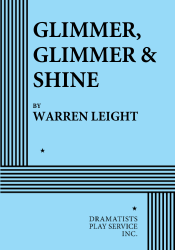
THE STORY: In the 1950s, twin brothers Martin and Daniel Glimmer, along with Eddie Shine, briefly formed the “Glow-in-the-dark” trumpet section of Glimmer, Glimmer & Shine. In 1955, on the seeming brink of success, Daniel Glimmer abruptly quit the music business and cut off all contact with his brother, Martin. Thirty-five years later, Martin’s protégé, Jordan Shine (Eddie’s son), meets Delia Glimmer at a wedding in Greenwich, Connecticut. She is Daniel’s daughter, works for her parents’ very successful garment business, yet knows nothing of his past, nor even of her Uncle Martin’s existence. Jordan brings Delia to meet her uncle, and she is shocked to find him in failing health and living in the squalor of a five-story walkup. When Martin falls into a coma, she confronts her father and asks him to help. He refuses but finally relents on the condition Delia stay away from Jordan. Delia and Jordan begin their romance shortly thereafter. Martin recovers but is physically unable to return to his walkup. Delia and Jordan shame Daniel into loaning Martin his corporate pied-à-terre. Daniel makes no effort to hide his disdain for Martin and his life. When Daniel learns of the budding romance, he squashes it by revealing to Jordan that Delia is engaged to someone else. She flees to Martin for answers to the emerging questions about her family. Martin, his health in steep decline, decides to tell Delia the truth. She is stunned to learn how, thirty-five years later, the aftershocks of choices made and secrets long buried reverberate not just for Marty and Danny but for Jordan and herself.
“It’s a marvelous, bitter, funny, hip play…” —New York Post.
“GLIMMER is like an evening of good jazz—sometimes raucous, sometimes bubbly, but deeply affecting.” —New York Daily News.
“GLIMMER, GLIMMER & SHINE delivers a gentle but wise nod to the innate reality of the musician’s life, to the beat of a music that defined a generation…GLIMMER, GLIMMER & SHINE has moments of considerable hilarity, moments of pathos and of romance…the play is about self-definition, celebrating the art of being and knowing oneself. In a way, it proves to be much like jazz itself.” —Star-News.
“Leight fashions a touching drama about the perils of long-buried secrets and abandoned dreams. There’s an abundance of humor that’s almost always tinged with sadness…a play with a lot of heart…” —Daily Breeze.
“It has the feeling of a beautifully orchestrated Ellington big-band number…” —Orange County Register.
